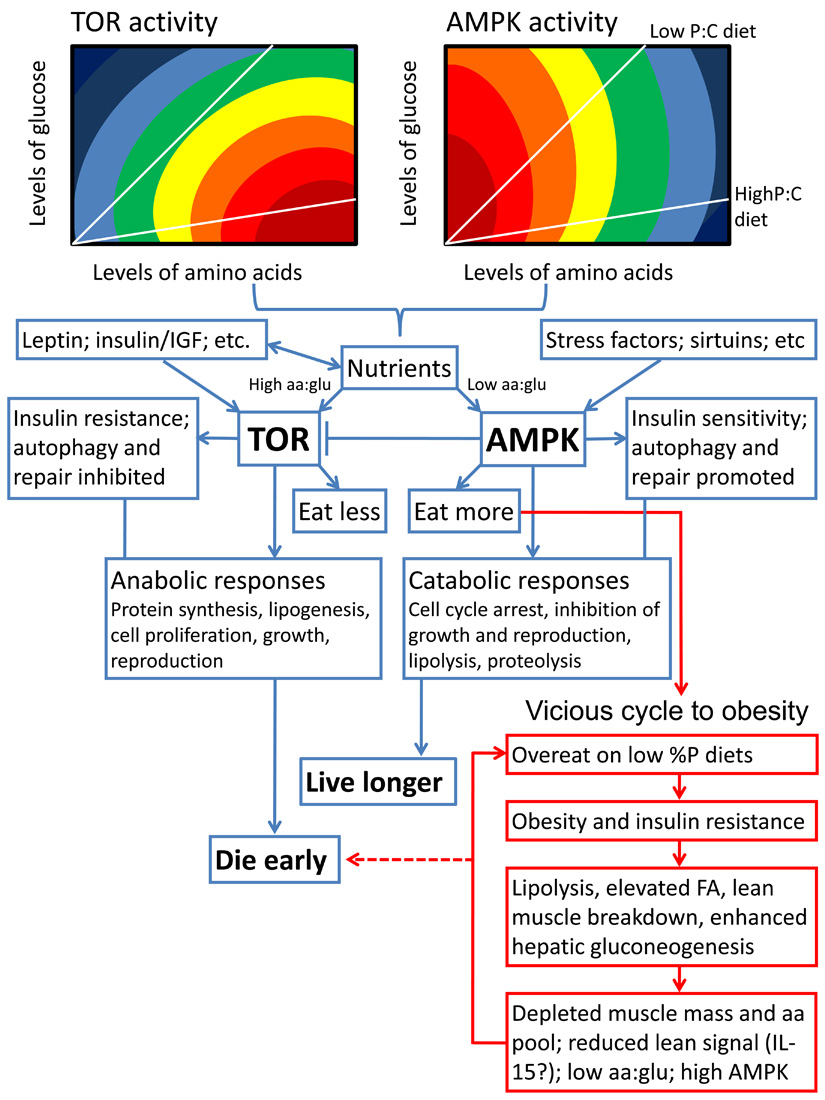High Protein:calorie Ratio Feed Makes Insects Die Early
increasing the ratio of protein and non-protein energy in the diet decreases lifespan; but as seen in the example from male crickets discussed above, if this ratio falls too far there is an increased risk of decreased longevity associated with obesity
uh-oh. i like my high-protein diet. i need muscles to do well in soccer and volleyball. and it’s easy not to overeat when you’re not craving protein. this suggests a benefit from titrating protein somehow (being sensitive to how much of it you need for your activity level).
protein intake is more strongly regulated than that of carbohydrate and fat [20]. As a result, protein appetite drives overconsumption of energy on low percent protein diets, promoting obesity and metabolic disorders with consequent effects on longevity
so, be skinny, on as little protein as you can get away with (obviously you’ll die with 0 protein in your diet; likewise with 0 fat).
the major causes of increased longevity in studies on calorically restricted primates (most recently [30]) is a reduction in the incidence of diabetes, cancer and cardiovascular disease relative to ad libitum fed controls. This may not result from benefits associated with CR per se, but rather reflect the costs of nutrient imbalance when feeding ad libitum on a fixed diet. As the required balance of nutrients changes over time (with time of day, season, growth and development, and senescence), animals will be forced to overeat some nutrients to gain enough of others
speculation without evidence - they seem to be suggesting that ideally you eat the minimum amount of food necessary for all vitamin / macronutrient needs. but it’s also true that if you have excess body fat, you’ll survive surgery better. some excess makes you more robust. we can’t really titrate perfectly.
i suppose the overall question would be: how much quality of life do you have to sacrifice by risking insufficient intake of various nutrients, in order to maybe live longer? nobody knows the answer for humans, yet.When protein is eaten in higher then optimal quantities relative to non-protein energy it shortens lifespan - in insects certainly and perhaps too in mammals
yes, perhaps. i hope not, but it needs to be studied - how sensitive is the curve? how “too much” can you do while barely reducing lifespan?
- but what might the underlying mechanisms be? There are several possibilities, including enhanced production of mitochondrial radical oxygen species [19,31], DNA and protein oxidative modification, changes in membrane fatty acid composition and mitochondrial metabolism [19,32], changes in the relationship between insulin/IGF and amino acid signaling pathways, including TOR [33-38], toxic effects of nitrogenous breakdown products and capacity to deal with other dietary toxins [39,40], changes in immune function to pathogen attack [41,42], and changed functioning of circadian systems [43].(their hypothesis … AMPK extends life unless you have too much and develop metabolic syndrome (the obesity disease), TOR shortens it.) insects are quite different than humans. i’m waiting for more evidence that a high-protein-ratio diet shortens life (but i’ve suspected/feared it for a while)
